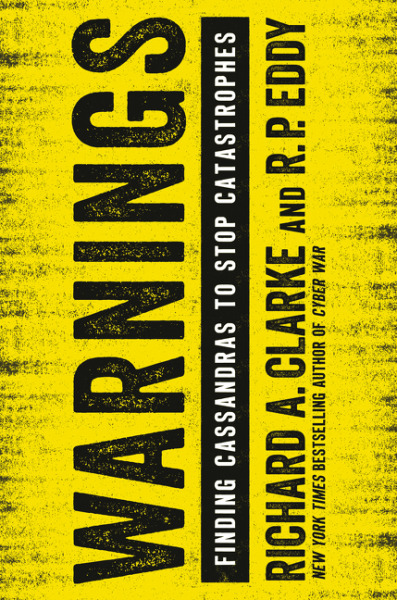 Warnings: Finding Cassandras to Stop Catastrophes by Richard A. Clarke and R.P. Eddy (2017 non-fiction)
Warnings: Finding Cassandras to Stop Catastrophes by Richard A. Clarke and R.P. Eddy (2017 non-fiction)
Readers may remember from Greek mythology the beautiful princess Cassandra, given the ability by the god Apollo to foresee impending doom, but also the inability to persuade anyone to believe her. Such is the premise of this important book in which the authors describe a number of ‘catastrophes’ in which a modern-day Cassandra attempted to alert citizens, politicians, government and military officials to an impending problem which, in their view, would have major impacts if nothing was done to address the warning. Clarke and Eddy present seven examples of major warnings such as before the Fukishima Nuclear Disaster (incontrovertible data about earthquakes and tsunami levels was ignored in the planning for the nuclear station); before the Bernie Madoff Ponzi Scheme where an accountant warned for years that the financial data was all a sham; and before the Upper Branch Coal Mine Disaster where a coal mine inspector warned that dangerous conditions in the mine were being ignored by companies seeking to increase coal production and profits to the detriment of miner safety. The authors have developed a “Cassandra Coefficient” consisting of 1) the warning, 2) the decision makers, 3) the possible Cassandra, and 4) the critics, and then the characteristics of each category. Following this discussion, and after noting some false Cassandras whose warnings were not valid, Clarke and Eddy present seven current “Warnings” describing the reasons for such concerns. These include extremely serious issues that are currently confronting citizens of the world: Artificial Intelligence, Pandemic Disease, Sea-level Rise, a Nuclear Ice Age, the Internet of Everything, a Planetary Meteor Strike, and Gene-editing. The book presents the scientists, engineers, biologists, journalists, etc., that are making these warnings and asks the readers to become informed and address these predictions in thoughtful and comprehensive ways. There are important recommendations about how these discussions must go forward and it is incumbent on everyone concerned about the future of humanity to think about, discuss and take actions to ensure that we as humans have the ability to respond to modern day Cassandras. We have been warned!
Reviewed by Ned Lyke

